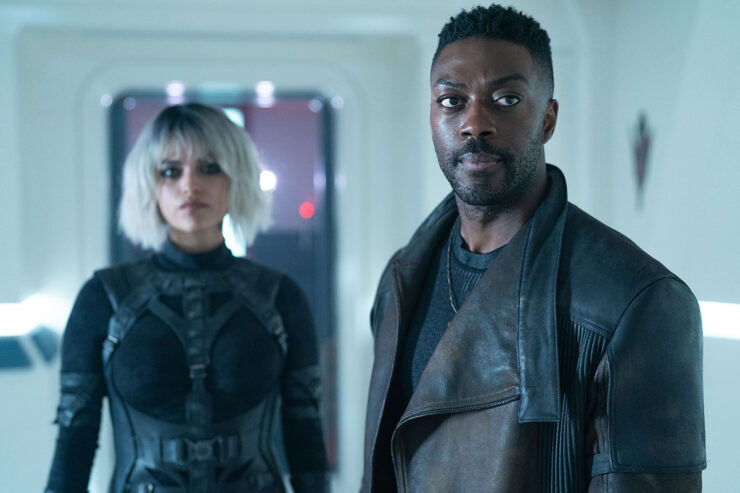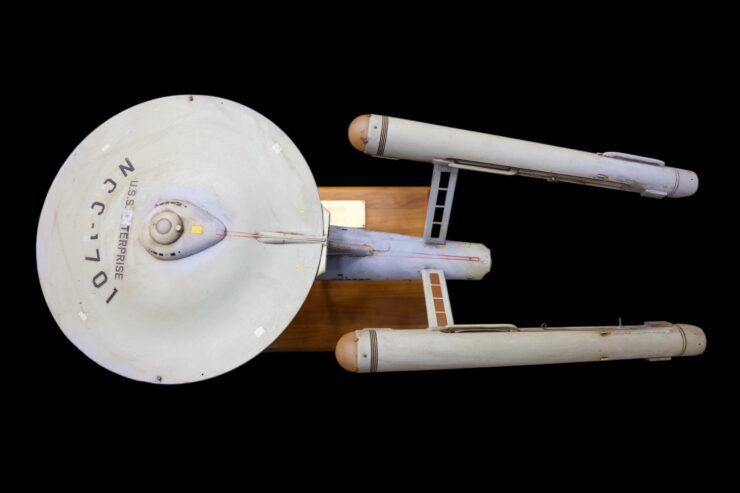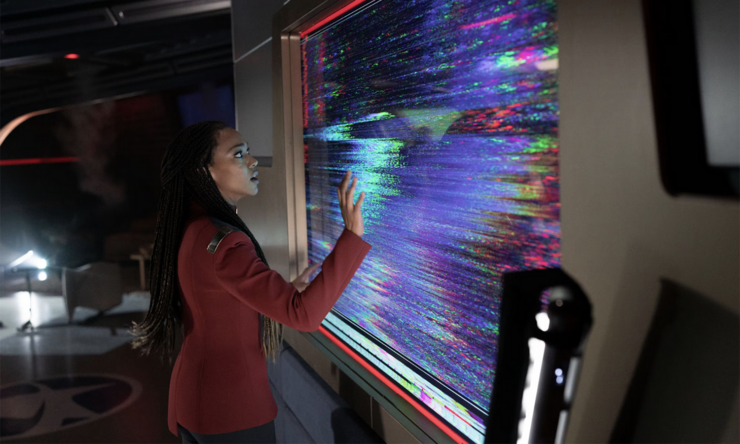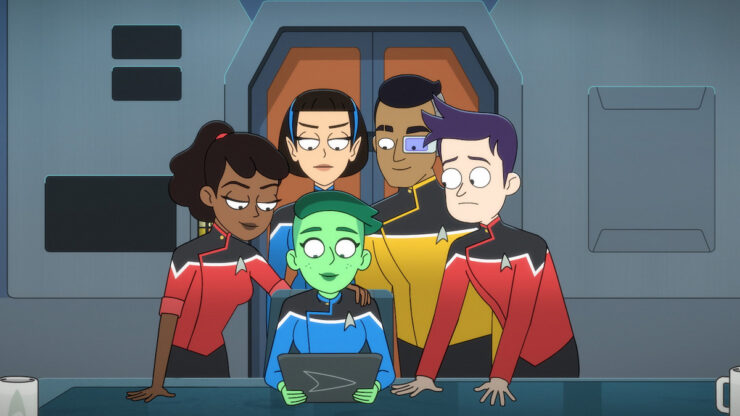“The Drumhead”
Written by Jeri Taylor
Directed by Jonthan Frakes
Season 4, Episode 21
Production episode 40274-195
Original air date: April 29, 1991
Stardate: 44769.2
Captain’s Log: The latest participant in the officer exchange program (seen in both “A Matter of Honor” and “Sins of the Father“) is J’Dan, a Klingon exobiologist. Unfortunately, he appears to have provided schematics of their dilithium crystal chambers to the Romulans and also sabotaged the warp drive. He denies everything while being interrogated by Riker and Troi—but when Worf escorts him to his quarters, he offers Worf reinstatement from his discommendation if he’ll just provide a shuttle. Worf’s response is an elbow to the stomach, a fist to the face, and an assurance that the Klingon High Council will provide him with a slow death.
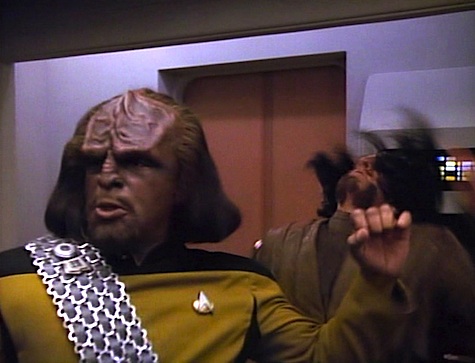
Admiral Norah Satie comes out of retirement to aid in the investigation. She beams aboard, along with her staff. Picard escorts her to engineering, where La Forge shows her the playback of the explosion in the warp core. The isolation door is still down, as radiation levels are high, but sensors indicate that the articulation frame collapsed—and there was no sign of any trouble until just before the explosion, which lends credence to the sabotage theory.
Picard and Satie discuss concerns over a possible Klingon-Romulan alliance. Worf enters and shows them a hypo that J’Dan uses to treat an illness—but it’s been refitted with a device that can read digital information and convert it into amino acids, which he can then inject into someone else. Worf has also found that a Tarkanian diplomat who was on board while J’Dan was serving on the ship disappeared near the Cruces system. J’Dan maintains his innocence until Worf confronts him with the modified hypo, at which point he admits that he’s a Romulan spy. However, he denies sabotaging the warp core.
One of Satie’s aides is a Betazoid named Sabin Genestra, and he senses that J’Dan is telling the truth: he did steal secrets but did not sabotage the ship. Satie is concerned that the ship has bigger problems than just one rogue exchange officer.
Satie and Picard bond over tea and mutual admiration for Satie’s father, Judge Aaron Satie. The admiral confides that she wasn’t initially looking forward to working with Picard. Meanwhile, Genestra and Worf compose a list of people J’Dan dealt with while on board who need to be questioned; Genestra assures Worf that—given the circumstances of his discommendation—he was initially considered a security risk, but both he and Satie are confident in Worf’s ability given how thorough he’s been.
Satie starts conducting inquiries. One of those questioned is Simon Tarses, a mostly human medtech (his paternal grandfather is Vulcan), who gave J’Dan many of his injections. Genestra is sure that he’s lying, covering up something major. Satie wants Picard to restrict his movements, but Picard won’t treat a man as a criminal just based on Betazoid intuition. There needs to be proof, which isn’t there yet. Satie points out that waiting for that proof could lead to lives being lost.
Before they can continue the argument, La Forge calls Picard: they’ve been able to open the blast door and investigate the dilithium chamber more thoroughly. It turns out that, when the ship was repaired at McKinley Station, the articulation frame was replaced with a defective one. It broke down eventually and led to the explosion. It’s not sabotage, it was simply an accident.
Genestra and Satie are convinced that there’s still a saboteur on board, as Tarses was hiding something, and it’s unlikely that J’Dan was working alone.
A formal hearing is convened, which—to Picard’s surprise—is an open hearing. Satie feels that closed sessions invite rumor and speculation. Satie queries Crusher about who Tarses socialized with off-duty—a line of inquiry that Picard quickly cuts off. Genestra then questions Tarses, asking him about his access to medical supplies (including lying to Tarses by saying a corrosive chemical was used to sabotage the engine), then hits him with the biggie: Tarses lied when he enlisted in Starfleet. His paternal grandfather is Romulan, not Vulcan. Tarses invokes the Seventh Guarantee (the Federation equivalent of the Fifth Amendment).

Worf starts a detailed inquiry into Tarses’s life. Picard is furious, as this is turning into a witch hunt. Tarses’s invoking of the Seventh Guarantee should not be enough to provoke that level of suspicion.
Picard invites Tarses to his quarters and they talk. Tarses knows that his Starfleet career is finished because he lied on his application. Picard talks to Satie in private to convince her to cease the investigation, but she intends to expand the hearings to the entire ship. She’s also invited Admiral Thomas Henry of Starfleet Security to observe—and the first person on her list of people to be questioned is Picard.
Before questioning, Picard makes a statement expressing concern that they are proposing to end a man’s career due entirely to the fact that he has a relative who is of the same species as a current enemy. Satie then starts the questioning, mentioning that he’s violated the Prime Directive nine times. Genestra then questions Picard about “Ambassador T’Pel,” asking why he didn’t attempt to retrieve her from the Romulans. He questions the wisdom of having a security chief whose father was a Romulan collaborator. Satie also asks if he’s recovered from being transformed into Locutus, after being responsible for the destruction of 39 ships and the death of 11,000 people at Wolf 359.
Picard then quotes Satie’s father, which causes Satie burst into tears (yes, really), as she is disgusted by her father being quoted by someone who consorts with Romulans, and swears to bring Picard down.
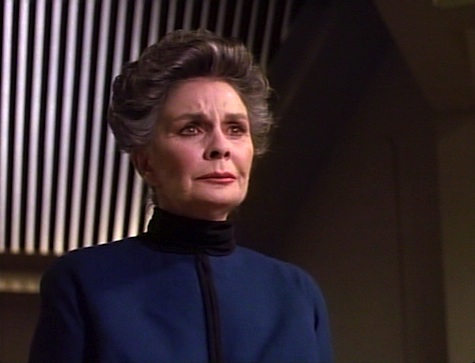
Admiral Henry then gets up and walks out, a show of no-confidence that leads to Satie and Genestra calling a recess.
Worf goes to see Picard, telling him that Admiral Henry has called an end to the hearings and that Satie and her staff have left the Enterprise. Picard delivers the moral of the story about how we must be vigilant against people who would clothe their villainy in righteousness, and we mercifully fade to black.
There is No Honor in Being Pummeled: Worf takes to McCarthyism like a duck to water, though it’s also his own investigation that exposes J’Dan. He mentions to Genestra that he’s “highly motivated” to investigate this crime, probably because of his discommendation—which Genestra later throws in his face during the questioning of Picard.
If I Only Had a Brain…: It strikes me as a missed opportunity for Satie not to have used Data as part of her conspiracy theory, since he took over the ship once…
I Believe I Said That: “Mr. Worf, villains who twirl their mustaches are easy to spot.”
Picard delivering the moral of the story while pointing out the tragic flaw in the character of Snidely Whiplash.
Welcome Aboard: Jean Simmons has always been a great actor, though you’d never know it from the one-dimensional performance she gives here. Character actor Bruce French is more effective in the still-rather-clichéd role of Genestra. As Admiral Henry, Earl Billings gets guest star billing for sitting in a chair and getting up and walking out of a room (nice work if you can get it). Henry Woronicz is probably the most ineffective Klingon since the unnamed doofus in “Friday’s Child.”
And for the first time in far too long, we have our Robert Knepper moment! I had totally forgotten that Spencer Garrett, a longtime character actor and particular favorite of mine, played Simon Tarses.
Trivial Matters: Satie is retconned into the investigation into the parasites that took over much of Starfleet Command in “Conspiracy.” In “All Good Things…” she’ll be established as being the person who signed Picard’s orders to take over the Enterprise.
Worf’s discommendation in “Sins of the Father” comes up multiple times, first as a concern then as a club to be used against Picard in his questioning. In addition, Satie and Genestra throw the events of “Data’s Day” and “The Best of Both Worlds Part II” in his face. The defective part that caused the explosion was put in while the Enterprise was being repaired, as seen in “Family.”
This story continues the undercurrent of a faction of Klingons wishing to ally with the Romulans, first seen with the use of a Romulan explosive on a Klingon ship in “Reunion,” then again with J’Dan’s spying here, and which will continue in “The Mind’s Eye” and “Redemption.”
Admiral Henry is seen again (and actually given dialogue) in the novel The Badlands Book 2 by Susan Wright. Sabin Genestra is part of an inspection team sent to evaluate the Enterprise just prior to the film Star Trek Nemesis in your humble rewatcher’s novel A Time for War, a Time for Peace.
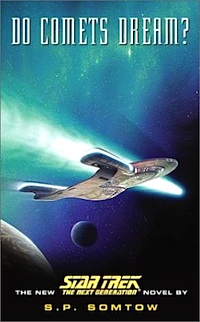 Simon Tarses recovers from his disgrace in this episode in the novels. After serving a six-month suspension for lying on his application, he returns to duty on the Enterprise in Sins of Commission, also by Susan Wright, and Do Comets Dream? by S.P. Somtow. Eventually he goes to Starfleet Medical, becoming both an officer and a doctor, serving on Deep Space 9 (as seen in Avatar by S.D. Perry and the Mission: Gamma miniseries), then later becoming chief medical officer of the U.S.S. Aventine (the Destiny trilogy by David Mack).
Simon Tarses recovers from his disgrace in this episode in the novels. After serving a six-month suspension for lying on his application, he returns to duty on the Enterprise in Sins of Commission, also by Susan Wright, and Do Comets Dream? by S.P. Somtow. Eventually he goes to Starfleet Medical, becoming both an officer and a doctor, serving on Deep Space 9 (as seen in Avatar by S.D. Perry and the Mission: Gamma miniseries), then later becoming chief medical officer of the U.S.S. Aventine (the Destiny trilogy by David Mack).
Director Jonathan Frakes used the films Judgment at Nuremberg and The Caine Mutiny as the basis for several shots in the episode.
It’s not specified what the nine Prime Directive violations are. The events of “Justice,” “Pen Pals,” “Who Watches the Watchers?” and “Legacy” are possibilities for four of them. One wonders about the other five…
This episode also established the exact number of ships lost at Wolf 359 in “The Best of Both Worlds Part II,” as well as the casualty number.
Make it So: “I don’t like what we have become.” There’s a good Star Trek episode to be made about the short road from concern to paranoia, and about the object lesson inherent in Benjamin Franklin’s famous quote, “They who can give up essential liberty to obtain a little temporary safety, deserve neither liberty nor safety.” And by “to be made” I mean, made after this one, specifically, the two-part Deep Space Nine story “Homefront” and “Paradise Lost,” which does an excellent job with this theme.
“The Drumhead,” not so much. The opening of the episode is spent with characters going on at great length about how awesome Satie is, while the admiral herself does nothing in particular to impress, and then once the investigation gets out of hand, she is completely demonized. There’s no nuance here—first she’s brilliant, later she’s evil, with no middle ground.
To make matters worse, the episode stacks the deck against her, having the witch hunt against Tarses occur after La Forge and Data have established that the “sabotage” was in fact an accident. The moral quandary would have been far less black and white if the sabotage theory was still in play when Tarses had his life taken apart piece by piece.
(There’s also a big “aroooo?” moment, when Satie goes on about how she’s spent the last four years not living anywhere, hopping from starship to shuttlecraft to starbase, fighting the good fight — when at the top of the episode she said she came out of retirement for this inquiry. Which is it?)
And then there’s the awful climax. Picard being turned into a Borg is a legitimate avenue for inquiry, given what Locutus did, but T’Pel? Really? She fooled the entire Diplomatic Corps, as well as Starfleet Command, for years,but it’s Picard’s fault that she was delivered back to the Romulans? Seriously? On the depth chart of people to be blamed for that one, Picard’s pretty danged low.
That’s not the worst part, though: in the end, we get this strong-willed, powerful, respected woman who is bound and determined to save the Federation at all costs—that is, until Picard quotes her father, at which point she turns into a crazed, blubbering mess. And then, all of a sudden, it’s over.
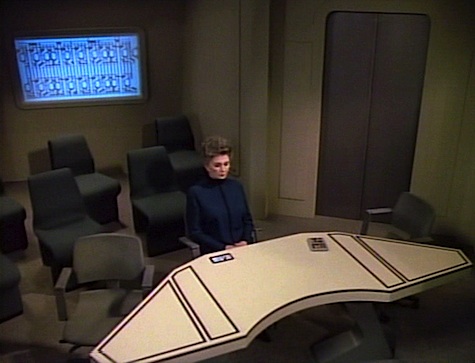
Just to make sure we get it, Picard then self-righteously delivers the moral of the story to a now-contrite Worf. It’s a good moral, mind you, and one that remains important. Hell, the lesson Picard provides is more applicable following the events of ten years and eight months ago than it was in 1991. But it’s given in an episode that is unsubtle and unconvincing and unimpressive.
Warp factor rating: 3
Keith R.A. DeCandido will admit to having enjoyed writing Genestra in A Time for War, a Time for Peace, mostly because, taking his cue from this episode, he wrote Genestra as a total bastard. Go to his web site so you can buy his books, which are just totally awesome.











